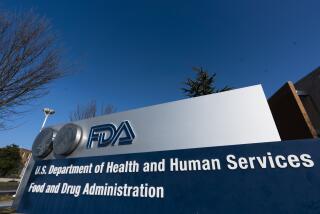Genetic testing industry’s future under the microscope
Someday soon, a company will offer to decode your genome for as little as $1,000. To make sense of your unique collection of A’s, Cs, Ts and Gs, you may turn to a genetic counselor -- DNA guides who have been advising patients since the early 1970s. The profession routinely appears on lists of hot jobs for the 21st century.
During the National Society of Genetic Counselors annual meeting last month in Los Angeles, President Angela Trepanier took a break to discuss the future of personalized medicine.
--
Will genetic testing become a routine part of healthcare?
Everybody will have a genetic test. A full genome sequence will be available in the next 10 years, and it might be available sooner than that. It might be done as part of newborn screening, but you get the relevant results at the relevant stage of life. So you roll out the results related to childhood conditions at birth, the ones related to chronic adult-onset diseases in adulthood, and so on.
--
Can genes predict who will get conditions like heart disease and diabetes?
So much of chronic disease is not related to a single gene, but there is some significant genetic component. If you can identify it, it might result in targeted therapies. That is where I see the future and the promise of personalized medicine.
--
So many companies are selling genetic tests directly to consumers without going through doctors. Is that a good thing?
The positive element is that it empowers people to take control of their healthcare. The negative is that there’s no medical professional to help you interpret what your results mean. If your only source of information is the company selling the test, is that really the most credible source of information?
--
Should DNA tests be used to test for traits like intelligence, athletic aptitude or artistic talent?
I would not use DNA tests for any of those reasons. All of these traits develop as a result of genetic and environmental factors. So for instance, even if a person has a low genetic aptitude for music, if her parents routinely play music in the house, send her to lessons, take her to concerts, and she is a highly motivated person who does what it takes to accomplish her goals, she may become a concert pianist despite her genetic makeup.
I would not want to use information in any way that could pigeonhole a person’s potential or desires or prevent them from having the same opportunities that others have, and I think that genetic tests for these types of traits could do that.
--
Has the industry gotten out of hand?
Technology has outpaced regulation. There are all sorts of other products available where as consumers we all need to be informed before making a purchase. This may not be any different.
Where there may need to be more scrutiny is in the claims being made about the value of the information. If we’re going to give consumers information, it should be valid, useful information. People have to enter into the testing knowing exactly what the limits, the benefits and the risks potentially are. Otherwise it’s unethical.
--
What’s the potential harm?
The emotional harm of finding out something that completely blindsides you, like [being at risk for] Alzheimer’s disease. There’s the financial harm of doing a lot of screening tests [for a disease] and then finding out five years later you never needed to do that. If you find out you’re at low risk for heart disease, then you don’t cut back on that extra hamburger, you don’t exercise. What if that’s against the medical advice you’ve gotten from your physician? That’s a potential harm.
--
Are there other consequences of getting a genetic test?
People should think about how it might impact the rest of their family. It’s a little different than other tests like cholesterol testing.
--
How so?
If you find out you have a baby affected with some condition, and your female relatives could have the same thing, I think there’s an obligation to share that information.
--
Are you surprised by the proliferation of genetic tests offered directly to consumers?
Yes, I am absolutely surprised by the proliferation of DTC [direct-to-consumer] tests and nonmedical tests in general. When I graduated in 1994, the BRCA1 and BRCA2 genes [for breast cancer] had not yet been identified, and cystic fibrosis and Huntington disease genes had just been identified. I am amazed at how quickly the number of even the medical genetic tests has increased.
--
What is your greatest worry about the future of genetic testing?
Access. If personalized medicine does what it promises to do, we should all be healthier. But personalized medicine will not work if we still have over 30% of our population uninsured or without access to affordable healthcare. This will result in more health disparities.
--
Have you taken any of these tests yourself?
No. I’m not sure I’d want to know I’m at risk for something that I might not really be at risk for. Why do I want to make myself worried?
--







